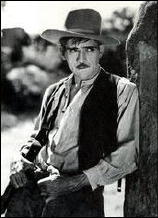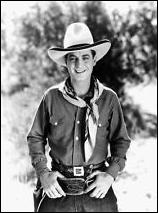Sun 29 Jun 2014
A Western Movie Review: THE UTAH KID (1930) with BORIS KARLOFF.
Posted by Steve under Reviews , Western movies[7] Comments
THE UTAH KID. Tiffany Productions, 1930. Rex Lease, Dorothy Sebastian, Tom Santschi, Mary Carr, Walter Miller, Lafe McKee, Boris Karloff. Director: Richard Thorpe.
The movie begins with a sheriff’s posse hard on the trail of a single man on horseback. He’s young and clean-cut, a good looking fellow with a smart horse, so how could he be an outlaw? The young fellow is Cal Reynolds (Rex Lease), and looks to the contrary, he’s definitely on the wrong side of the law, since as it turns out, the safe haven he’s heading for is a place called Robbers’ Roost.
Thanks to the overall dull minds of the posse after him, he makes it safely. Now Robbers’ Roost is exactly the kind of place you’d expect it to be, given the name, and the fellow in charge is called Butch (Tom Santschi) and the one who appears to be the second-in-command is Baxter (Boris Karloff, and the only reason this old western movie is in any kind of demand today; rumor has it that there may be only one surviving print).
Also on hand is Parson Joe (Lafe McKee), an elderly gentleman who is not allowed to leave, else he may reveal the outlaws’ hideout to the authorities, so he has decided to stay on willingly. Where else could he find so many sinners whose souls he might save? Found by Baxter wandering around the vicinity (no other explanation given) is a young girl named Jennie Lee (Dorothy Sebastian). To save her from being killed, or worse, young Cal claims that she is his fiancée, and (gulp) is forced to marry her on the spot, thanks to the presence of Pastor Joe.

What young Cal does not know is that Jennie is engaged to the local sheriff (Walter Miller), which puts him in quite a predicament – and she as well, as it is clear that she is falling for young Cal, and hence the rationale for quite an entertaining western, believe it or not. There are no singing cowboys, no stupid sidekicks, only a small but incisive love story that probably needn’t have taken place in the West, only this one did.
As for Boris Karloff, although his role is brief, he is a joy to watch and listen to. His voice is as mellifluous as you’d expect it to be, even in this very early talkie, and his body language is certainly more expressive than it needed to be, in this otherwise undemanding role of the second in command of a fourth rate gang of robbers and thieves.
He was an actor with a future (second sight is wonderful), while Rex Lease, as it turned out, as young and handsome as he was, ended up with far less of a career than Mr. Karloff’s.

June 29th, 2014 at 10:44 am
Rex Lease, of course, married Clara Bow and went in to politics, serving as Lt. Governor of Nevada and campaigning for the top spot when he died suddenly. Richard Thorpe signed on with MGM as was there making more than competent, if uninspired, big time films for 25 years or so, and Tom Santschi died the year following Utah Kid, 1931, and was probably best known for playing McNamara opposite William Farnum in the first filming of The Spoilers, 1914.
June 29th, 2014 at 2:09 pm
Karloff did a whole array of films in the late 1920s and early 1930s. One I am curious to see is Tarzan and the Golden Lion (1927) where he portrays an African tribesman.
June 29th, 2014 at 3:17 pm
Barry
Re Rex Lease, I’m sure you’re thinking of Rex Bell, another second or third rank western movie star of the 30s, am I right?
June 29th, 2014 at 3:57 pm
Steve,
Yes, of course, and I had the right guy in mind but not in typing hand. I liked Rex Lease, but all I wrote is about Bell.
June 29th, 2014 at 4:21 pm
Follow ;up:
The point of my comments re ‘Bell’ — Thorpe — Santschi — is that this genuinely little film had interesting credits beyond Karloff.
June 29th, 2014 at 5:46 pm
Tarzan and the Golden Lion is available as a serial finally. Its the one with ERB’s son-in-law Jim Pierce (radio’s Tarzan), the Tarzan with such tender feet he had to wear sneakers.
Karloff looks much the same in that as in de Mille’s Unconquered (which is mostly a serial without chapters) as a Native American, though the make up is darker.
Karloff and Lugosi both appeared in a few silents, Karloff as lead villain in one serial (a semi talkie) with Walter Miller, and Lugosi as Wallace Beery’s Hawkeye’s Mochican friend in Last of the Mohican’s.
And don’t forget Karloff’s memorable gangster in Scarface. He has a great role as a pious but ruthless reporter in one with Edward G. Robinson in Scandal Sheet.
Lease did a variety of films including a semi horror outing with Misha Auer the villain (honestly). He was right on the cusp of the singing cowboy fad that got so bad at one point even John Wayne had to be dubbed singing and playing the guitar (it was supposedly Gene Autry on the guitar). It’s not far off this time that Ken Maynard discovered Autry.
This was around the period when Noah Beery Jr. was starting as lead in a few westerns, the Duke was recovering from The Big Trail fiasco, and old pros like Mix, Maynard, and McCoy were still turning out new westerns.
July 2nd, 2014 at 11:48 am
I’ve often thought that had Karloff had not hit stardom with FRANKENSTEIN, he probably would have become a member of the Ford/Hawks stock company of featured players. One can almost see him as Luke Plummer or Poordevil (in THE BIG SKY.)